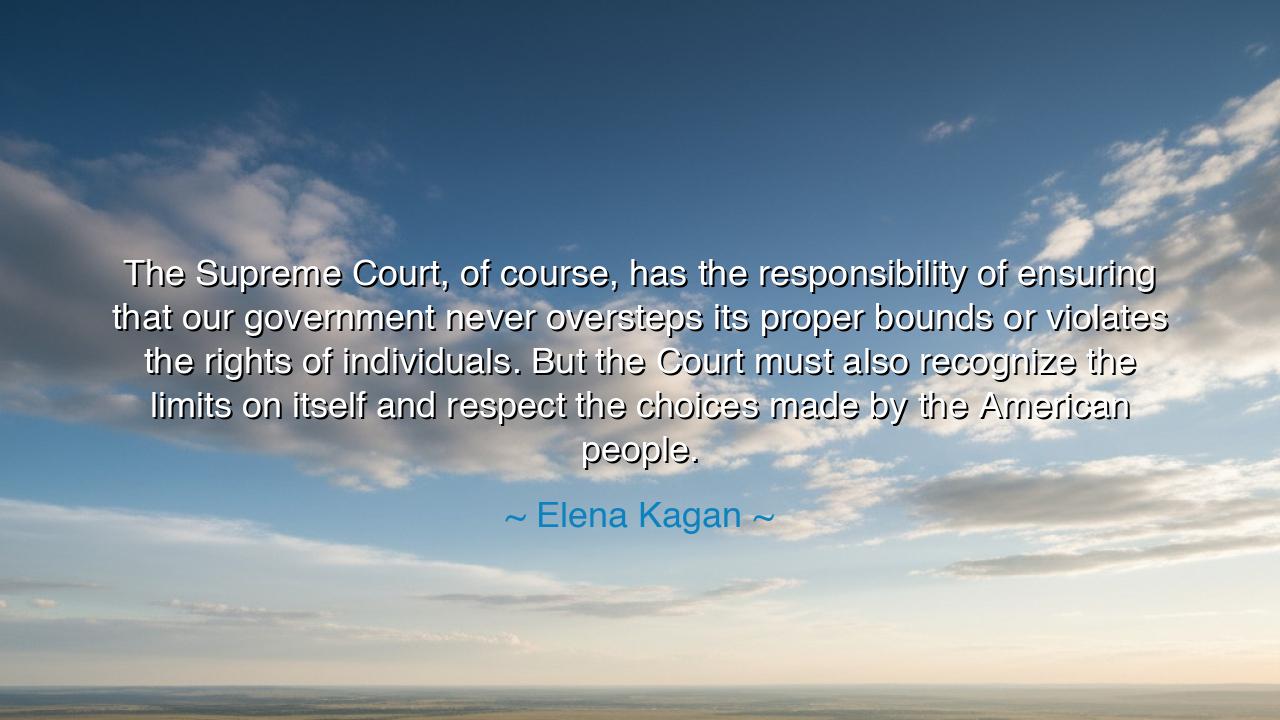
The Supreme Court, of course, has the responsibility of ensuring
The Supreme Court, of course, has the responsibility of ensuring that our government never oversteps its proper bounds or violates the rights of individuals. But the Court must also recognize the limits on itself and respect the choices made by the American people.






The words of Elena Kagan, spoken with calm wisdom and deep understanding, echo the timeless balance upon which the American Republic stands: “The Supreme Court, of course, has the responsibility of ensuring that our government never oversteps its proper bounds or violates the rights of individuals. But the Court must also recognize the limits on itself and respect the choices made by the American people.” In these words, Justice Kagan does not speak merely of law, but of harmony—the fragile equilibrium between power and humility, between the authority to judge and the restraint to listen. Her words remind us that justice, like liberty itself, must be measured not only by its strength but by its discipline.
The origin of this quote can be traced to Kagan’s reflections on the nature of judicial power during her nomination to the Supreme Court of the United States in 2010. As a scholar of constitutional law, she understood the sacred role of the Court—to act as guardian of the Constitution, the protector of liberty against tyranny, and the final interpreter of law. Yet she also understood the danger of judicial overreach: that when judges replace the will of the people with their own vision of righteousness, they risk becoming the very tyrants they were appointed to restrain. Kagan’s statement, therefore, is both a declaration and a warning—an affirmation that the Court’s greatness lies not only in its authority but in its humility.
In the style of the ancients, let us consider this truth as though it were carved upon a pillar of marble. The Supreme Court stands as the sentinel of the Republic, the guardian of the boundary between freedom and power. It is the last refuge of the voiceless, the last fortress against corruption and tyranny. Yet even sentinels must know their station. When the Court becomes too bold—when it begins to rule not as interpreter but as creator—it trespasses upon the will of the people. The Constitution was never meant to make philosophers of judges, but servants of the law. Thus, Kagan’s wisdom is that justice must be anchored in humility. Power without self-restraint becomes despotism, even when clothed in robes of law.
History itself bears witness to this delicate balance. In the year 1857, the Supreme Court rendered the infamous Dred Scott v. Sandford decision, declaring that African Americans could not be citizens and that Congress had no authority to prohibit slavery in the territories. The Court, intoxicated with its own authority, reached beyond the law and into the realm of politics—and in doing so, betrayed justice itself. The decision deepened the divisions of the nation and hastened the march toward civil war. Here we see Kagan’s warning made flesh: that when the Court forgets its limits, when it abandons humility for power, it becomes not a shield of liberty, but an instrument of ruin.
Yet history also shows the nobility of balance. In Brown v. Board of Education (1954), the Court rose to its highest purpose, striking down racial segregation in schools and restoring the Constitution’s promise of equality. The decision did not invent a new moral law—it merely reminded the nation of the truth already written in its founding creed: that all men are created equal. Here, the Court acted within its rightful sphere, not as ruler but as guardian of conscience. Thus, the true measure of the judiciary lies not in how often it acts, but in how wisely it chooses when to act—and when to refrain.
Kagan’s words speak to more than law; they speak to the nature of power itself. Every human institution—be it a court, a congress, or a people—must balance freedom with responsibility, courage with restraint. The wise understand that justice cannot thrive where power is unrestrained, nor where authority is timid. The Court, she reminds us, must walk the narrow path between these extremes: strong enough to defend liberty, yet humble enough to respect the will of the governed. This balance is not weakness—it is the highest form of wisdom.
So, my children of the future, take this teaching into your hearts. Understand that justice is not an act of domination, but of service. The law must protect, but it must also listen; it must correct, but never control. In your own lives, when you wield power—be it in judgment, leadership, or influence—remember Kagan’s counsel: know your limits, and respect the freedom of others. True authority is not the power to command, but the discipline to use power wisely and sparingly.
For as Elena Kagan teaches, the health of a democracy depends upon the humility of its institutions. The Court must guard the Constitution, the government must serve the people, and the people themselves must remain ever vigilant, lest liberty decay through neglect or excess. When all three remember their roles, the Republic endures—not through might, but through balance. And when you stand before the temptations of power, let this truth be your guide: justice without humility is tyranny, but justice with humility is freedom eternal.






AAdministratorAdministrator
Welcome, honored guests. Please leave a comment, we will respond soon